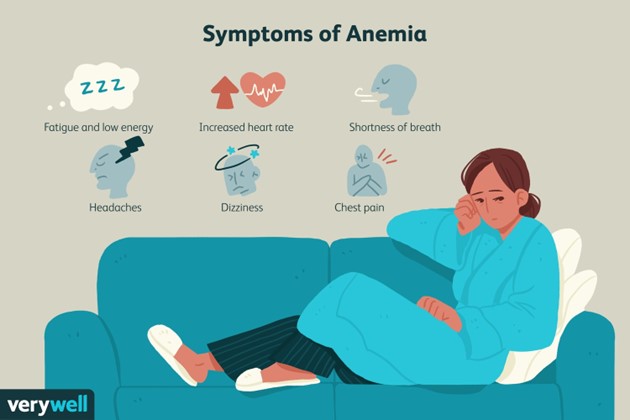A nurse is caring for a client who has anemia.
Which of the following assessment findings should the nurse anticipate with the client's condition?
Headache.
Bradycardia.
Heat intolerance.
Flushed skin color.
The Correct Answer is A
This statement indicates an understanding of the teaching because headache is a common symptom of anemia.
 Choice B is incorrect because bradycardia (slow heart rate) is not a common symptom of anemia.
Choice B is incorrect because bradycardia (slow heart rate) is not a common symptom of anemia.
Instead, anemia can cause irregular heartbeats or a fast heartbeat.
Choice D is incorrect because flushed skin color is not a common symptom of anemia.
Instead, anemia can cause pale or yellowish skin 1.
Choice C is incorrect because heat intolerance is not a common symptom of anemia.
Nursing Test Bank
Naxlex Comprehensive Predictor Exams
Related Questions
Correct Answer is C
Explanation
Platelets 70,000/mm.
The priority finding for a nurse assessing a client who has cirrhosis to report is a platelet count of 70,000/mm.
A low platelet count (thrombocytopenia) can be a complication of cirrhosis and can increase the risk of bleeding.
A platelet count below 150,000/mm3 is considered low and should be reported to the provider.
Choice A is incorrect because while a distended abdomen can be a sign of ascites, a complication of cirrhosis, it is not the priority finding to report.
Choice B is incorrect because while clay-colored stools can be a sign of biliary obstruction, it is not the priority finding to report.
Choice D is incorrect because while an elevated alkaline phosphatase level can be a sign of liver damage, it is not the priority finding to report.
Correct Answer is C
Explanation
“You should expect a warm sensation after the injection of the contrast dye during the procedure.” During cardiac catheterization, a contrast dye is injected into the body to highlight blood flow through the arteries and show blockages in the blood vessels that lead to the heart.
This can cause a warm sensation.
Choice A is incorrect because usually, patients are awake during cardiac catheterization but are given medications to help them relax.
Choice B is incorrect because recovery time for a cardiac catheterization is quick.
Choice D is incorrect because there is no information found to support this statement.
Whether you are a student looking to ace your exams or a practicing nurse seeking to enhance your expertise , our nursing education contents will empower you with the confidence and competence to make a difference in the lives of patients and become a respected leader in the healthcare field.
Visit Naxlex, invest in your future and unlock endless possibilities with our unparalleled nursing education contents today
Report Wrong Answer on the Current Question
Do you disagree with the answer? If yes, what is your expected answer? Explain.
Kindly be descriptive with the issue you are facing.
